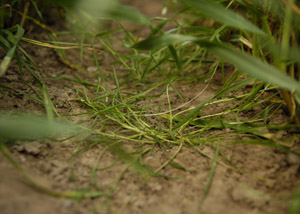
WINTER wheat and winter barley growers concerned about controlling annual meadow-grass after the forthcoming planned withdrawal of the commonly-used herbicide isoproturon (IPU) will have an alternative solution to choose from this autumn – following the launch of new guidelines specially developed by Syngenta for its herbicide Defy.
According to Syngenta technical manager Iain Hamilton, annual meadow-grass is one of the most common grass weeds affecting crops in the UK, present across much of the country.
But the planned, phased withdrawal of IPU – due to start with a dose reduction this September and continue in 2008 and 2009 – will leave a major gap in cereal growers' herbicide armoury for tackling the weed, once it takes full effect, he points out.
So to provide growers with an effective alternative, Syngenta has been evaluating a range of other cost-effective mixtures, using a reduced dose of Defy.
"Although Defy was originally developed at a higher dose against black-grass and rye-grass when it was launched last season, we knew it also had a broader spectrum," explains Mr Hamilton, "including annual meadow-grass and a wide range of important broad-leaved weeds on the product label.
"For this autumn, we're therefore launching a new, lower dose core guideline of 1.5 to 2.0 l/ha of Defy mixed with diflufenican for use in situations where annual meadow-grass and broad-leaved weeds are the main targets in winter wheat and winter barley.
"This not only gives growers a highly effective alternative to IPU mixtures, but Defy also offers excellent crop safety in these crops.
"In trials, 2.0 l/ha of Defy with 0.1 l/ha of diflufenican has given an average of 97.4% control of annual meadow-grass – versus 95% from an IPU-based mixture," he adds.
While Mr Hamilton says either dose of 1.5 or 2.0 l/ha of Defy can be used in the mixture against annual meadow-grass and broad-leaved weeds, for longer persistence or where weed infestation are larger, the higher 2 l/ha dose should be used.
"The new recommendation of Defy with diflufenican also has the flexibility to be applied from pre-emergence right up until the two leaf stage of annual meadow-grass.
"Additionally, when targeting specific broad-leaved weed problems, such as fumitory and poppies with annual meadow-grass, a range of other tank mix options for use with Defy have been developed."
In fields where black-grass or rye-grass are also present with annual meadow-grass, Mr Hamilton says it remains essential that growers continue to use the higher 4 l/ha dose of Defy plus an appropriate tank mix partner, to allow for the greater herbicide activity required against these weeds.
